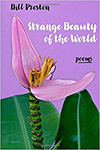Review — STRANGE BEAUTY OF THE WORLD: POEMS by Bill Preston (Thailand)
 Strange Beauty of the World: Poems
Strange Beauty of the World: Poems
Bill Preston (Thailand 1977–80)
Peace Corps Writers
148 pages
August 2018
$14.00 (paperback), $9.99 (Kindle)
Reviewed by Peter V. Deekle (Iran 1968–70)
•
Bill Preston (Thailand, 1977-1980) began his professional encounter with his native language, English, during his Peace Corps TEFL assignment, as did this reviewer. But Bill continued his formal engagement with English well beyond Peace Corps. This engagement has strengthened his expertise as a writer and poet. Strange Beauty of the Worldis a collection both personal and universal in its appeal, organized in broad sections of Bill’s experience and recollections. The universality of each poem enables the reader to find a unique voice and vision of the expressed sentiments and events.
Regardless of style and form (mostly extended narrative forms, but a few, often playful, rhyming) the poems seem to this reviewer both appropriate to the themes and evocative of each subject’s meaning. Readers may readily relate to a poem’s references not only of events and circumstances, but also cultural and social norms of the period associated with them.
Bill Preston and this reviewer share a generational bond that furthers the understanding and appreciation of the world represented in the poems’ “strange beauty.” All readers will recognize the contemporary events (for instance, Iraq invasion of 2003) that inspire the poet. Length, tone, meter all fittingly reflect the subjects at hand. And each poem within a section encourages the reader to continue to the next in anticipation of an expanding perspective. This reviewer was captivated by this evolving perspective, and believes that other readers will be, too.
The Peace Corps service experience has often been said to universally and individually offer lasting impact on volunteers. This truism is subtly represented throughout Strange Beauty of the Worldas poems about daily life during Bill’s service are juxtaposed to more contemporary themes and events – linking the past with the more recent. For example, Bill’s Baltimore boyhood, his post-graduate life, and subsequent family are all contained in the collection’s first section (“Somewhere in Time”). Each poem stands alone, but also further informs others in a lifespan of experience.
Nowhere is the juxtaposition of individual experience and world events more personal and pointed than in the section entitled “Long Shadows of War.” Bill Preston places himself and, thus, the reader in the midst of the tensions and trials in Southeast Asia. Two poems on facing pages are prime examples. “Vigil” provides a short rhyming poem that captures in an economy of words the hopes and fears associated with the invasion of Iraq, while “In Memoriam” expresses the incomprehensible sorrows represented in the Vietnam Veterans Memorial.
The long narrative poem “Song” aptly follows two reflections on war that may trigger for the poet memories of his father’s life. While World War II prompted his father’s military enlistment it is the ensuing decades of daily life in Baltimore and elsewhere that the poet captivatingly recalls. For a former Peace Corps volunteer it is apparent that armed conflict and peaceful commerce are intertwined throughout this anthology.
A final consideration of the book’s title provides a connection for this reviewer to the poet . . . and to American poet laureates. Having enjoyed personal associations with two (Howard Nemerov and Billy Collins) I readily appreciate Bill Preston’s title selection – Strange Beauty of the World– from America’s first female poet laureate, Louise Bogan. How apt is this selection derived from Bogan’s contrasting “an axis of suffering” with a belief of existence “rest[ing] on pure joy.” Bill Preston’s poems collectively and wonderfully embody that contrast.
•
Reviewer Peter V. Deekle is editor of the National Peace Corps Association’s monthly Community Achievements feature. While still in high school he volunteered at Peace Corps headquarters and, following college graduation, served in Iran as a TEFL instructor (1968–70). His career spanned four decades in higher education administration.
One of my mentors is a poet and playwright. Through his friendship, I met several poets and studied their work. There is something about the rigorous training involved with picking just the right word that really aids them if and when they decide to write fiction. One example is Montana 1948 by Larry Watson. There is no extra verbiage, no piles of straw, no fancy word-weaving meant to impress the reader. This is also true if they decide to write essays as is the case for Martin Espada. I apologize for such a daydream like comment but poetry is definitely neglected in our education.
Peter,
Thank you for your kind words and thoughtful review. Glad to know that you connected personally with the poems. I hope the themes resonate with readers, and that they will make personal connections based on their experience.
Bill
Larry,
Thanks for recommending Montana 1948 by Larry Watson. I’m not familiar with the novel but will check it out. I am familiar with some of Martin Espada’s poetry. In my previous book, A Sense of Wonder: Reading and Writing Through Literature (a multicultural anthology aimed at ESL students, published by Pearson in 2003), I included one of Mr. Espada’s poems, “Jorge the Church Janitor Finally Quits,” which is powerful and moving. Agree that poetry is often neglected in our education, unfortunate given the many brilliant and diverse voices out there.
Bill
Bill: If you haven’t already, check out The Republic of Poetry by Espada. It’s incredible and guaranteed to make you smile.
I love the title, will definitely look for it. Thanks for the recommendation!